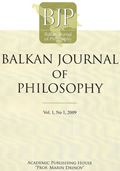Ontology and Functionalism in Hegel’s Phenomenology of Spirit
Ontology and Functionalism in Hegel’s Phenomenology of Spirit
Author(s): Claudiu BaciuSubject(s): Philosophy
Published by: Институт по философия и социология при БАН
Keywords: ontology; function; science; phenomenon
Summary/Abstract: The paper starts by describing the distinction between substantialist thought and functionalist thought. According to philosophical functionalism the object of human knowledge is always a result of an inner construction, and not a passive reflection of the outer world. The Critique of Pure Reason was the first modern materialization of this new philosophical program. One of the most important results of the Kantian criticism was the reconstruction of the concept of ontology. The possibility of ontology, according to its new concept, was given by the idea of identity between the possibility of reality, pertaining to human thinking and knowledge, and that which we call “reality”. The entire German Idealism took over this new concept of ontology. The specific Hegelian undertaking in the Phenomenology of Spirit was to show that this identity is not posited at the beginning, but is described in its development for consciousness. The study tries to show that this undertaking is a functionalistic one because here reality, as an object of consciousness, receives its specific configuration on the ground of the logical unity of the moments belonging to each form of consciousness and to their totality.
Journal: Balkan Journal of Philosophy
- Issue Year: II/2010
- Issue No: 2
- Page Range: 137-142
- Page Count: 5
- Language: English

